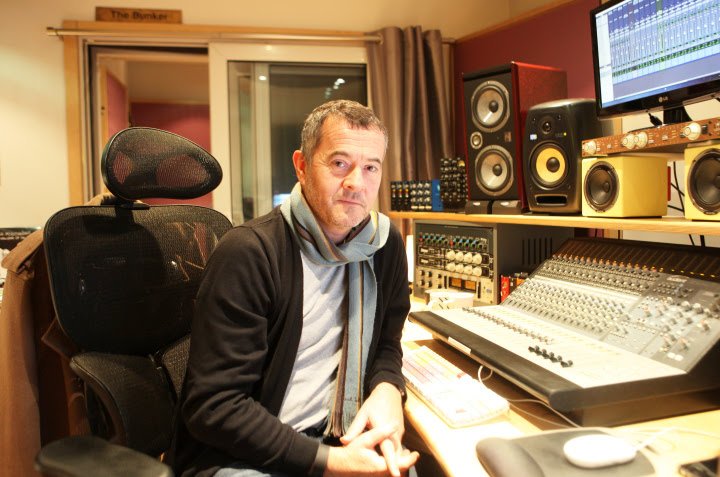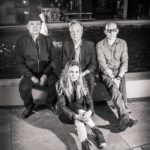Following on from Part 1 of the interview, God Is In The TV continues the chat with producer Stephen Street…
GIITTV: When you were working on Viva Hate with Morrissey, (Street wrote the music for the album), did you have a clear idea of which tracks would be singles?
SS: Well not really, I just sent through everything I had, all the ideas, recorded on a Fostex four-track cassette machine. It’s like how Johnny (Marr) worked with him, put the ideas onto a cassette, the gist of the song. I think the first session we did after Strangeways, we did do (first Morrissey solo single) ‘Suedehead’ in that session, and I think that it was quite evident straight away that it was going to be a single. There was something about it that was really special. I think it was in the next session we did ‘Everyday Is Like Sunday’ and obviously that has such a great classic vibe to it. I think those two songs did kind of stand out as the most single-like tracks on the record. That was a really testing time; you can imagine the pressure following up The Smiths – if it was really badly received by everyone, I would be public enemy number one! It was quite daunting, it really was, I think that the audacity I had…balls of steel! Looking back on it, it was scary as hell really, it really was. It was quite a dilemma but I’m really glad I took it on and I am very proud of it, and of the subsequent tracks that I worked on after that record.
There was a sigh of relief when the reviews started to come in then?
Yes, I remember when the reviews for ‘Sudehead’ came in, across the board the press were just so positive. In fact, Morrissey hadn’t been in touch with me for a couple of months after we finished the session, he kind of cut off communication as he often does, and it wasn’t until the reviews came out for ‘Suedehead’ and the press were all going mad about it, that he actually got on the phone to me again! I think he was hiding his head under a pillow for a while as well!
Was it a surprise when he got some of the other Smiths back in to do stuff like ‘The Last Of The Famous International Playboys’?
Well after ‘Suedehead’ and ‘Everyday Is Like Sunday’ had done so well in the charts, ironically they were bigger hits than The Smiths had had for quite a few years, he was more compelled to think about doing some live work and for that purpose getting Andy (Rourke) and Mike (Joyce) involved again, and of course Craig Gannon – he asked me whether I would have a major problem with that and I said ‘No’. The songs I gave them to work on, ‘Interesting Drug’ and ‘…International Playboys’ you know, they were my bass lines and such. I mean, Andy did his own version of it, but they were my bass lines. When you are writing a kind of a song, especially the kind of songs I was writing with Morrissey back then, I always was aware that the bass lines were very important to where Morrissey took his vocal, so we would often write a song around a bass line, like on ‘Interesting Drug’. Andy is such a lovely guy, he would add to it, and he is such a great bass player. I was so sad when The Smiths broke up and Morrissey was a bit rude about the input from Mike and Andy; I always thought their input was incredibly important and they are great players. It felt strange being the boss in those sessions and it did cause a bit of an atmosphere, which was the beginning in the decline of the relationship between myself and Morrissey.
You went on to form the Foundation Record Label around the same time; do you have fond memories of that?
Yeah – it was scary in the sense that I should have gone to a label and said ‘Can you finance me a bit on this?’, you know, this is the idea, and done it like a kind of production label. Whereas this, I was trying to fund it myself and be truly independent. It was very hard to keep one’s head above water, especially as there was that first initial kind of Rough Trade distribution collapse – it was the first kind of major problem in the recording industry when it came it finance and so on, so I basically took it as far as I could and I spent x amount of my own money on it, and I had a young family at the time. I thought ‘I just can’t do this anymore’. I’m proud though, of what we put out in that time.
I really liked the Bradford album (Shouting Quietly from 1990)…
I am working with them again at the moment actually! Ian and Ewan and I have kind of got ourselves together to make a new Bradford record. It’s all very early days yet, but it’s shaping up very nicely so far. Ian is in fine voice, he really is.
And Spin, who were on the label as well, went on to become Gene?
Yeah, some good came out of it, that’s the main thing. Gene were a great band, I thought they were excellent. I am proud of what we did. Looking back on it, it was a bit of a failed experiment, but some good came out of it at the end.
You also worked with Psychedelic Furs?
Yes, I was a big fan of theirs, and they asked me and I took the job on gleefully – that was working with them on an album back in the early nineties! So long ago!
Well, it’s their current album!
Yeah, it’s amazing isn’t it? They seem to have given up on the recording thing but have done a couple of solo things, and Love Spit Love. It’s such a shame as they were so good, they really were. I really love their records and loved working with them. It’s one of the few records that I have made in America.
And working with Blur, how did that come around?
It’s interesting; most times I have been working on records with bands, I have been approached by the management or record label, but in Blur‘s case it was different, in the sense that I had seen the video for their debut single, ‘She’s So High’ and my manager at that time, Gail Coulson, she was managing Jesus Jones, and they were on the same label as Blur, Food Records, David Balfe’s label, and I mentioned to her that if they are looking for a producer for the next Blur single, then I would be interested. Balfey came back and said that they were going to do the next single with the same production team who had done the first one, so I thought ‘Fair enough’ as it was a good single, and they had also done a bit of their first album Lesiure by this point. Anyway, they had tried to do a version of ‘There’s No Other Way’ and they weren’t very happy with it, so then the word had got back to the band that I was interested, and they said ‘Oh yeah!’ cos they were Smiths fans, and they said they would like to meet me, so we met, had a drink together in the pub in Soho, and they said “Let’s give it a go!’ So I went in the studio and did a couple of tracks with them, one of which was ‘There’s No Other Way’. So I did that with them, send the tapes off to Food and then the next week I am on the plane to New York to do the Psychedelic Furs album! I was there for two and a half months and by the time I came back, ‘There’s No Other Way’ had come out and been a huge hit! So I was asked to do a couple more tracks for the first album. But then that was it; Balfey for some reason didn’t want me to do the next record. They wanted to do the next album with Andy Partridge from XTC. Again, that didn’t work out and it’s funny, cos I was at a gig checking out The Cranberries as I was just about to start a session with them, and in the venue, The Marquee in Charing Cross Road, Graham Coxon is there. I saw Graham, he looked a bit down, and I asked him how it was going, and he said they had been doing some sessions and it wasn’t going great, so I gave him a pep talk, said ‘Keep your head up, you’re a great guitar player, you’re in a great band and it’s going to work out, I’m sure’. Two days later I got a call from Damon asking to meet up and that was it – I got back involved with them for Modern Life Is Rubbish.
And the rest is history!
Yeah, one of those chance meetings! It all kind of ties in around that period, Psychedelic Furs, Blur and The Cranberries!
And you worked with New Order on Waiting For The Siren’s Call / Lost Sirens too?
Yes, I did a fair amount with them on …Sirens, then what happened was that Bernard (Sumner) went off and did songs on his own and was kind of adding them to the album, so by the end there were a lot of tracks just stuffed onto the album at the last minute that weren’t produced by me and the band in the studio, so there were a lot of tracks left over, and a lot of those ended up on Lost Sirens. I really liked the single ‘Turn’, I was trying to get back to the New Order sound like on ‘Love Vigillantes’, rather than the really electronic side of New Order. That was the kind of thing I was aiming towards getting them back to. It’s got its flaws and the band were going through a lot of politics at the time…it’s a shame, as it was the beginning of the end for them, as it were. I enjoyed working with them, it was quite a buzz thinking I was there with a band I really liked.
Photo Credit: https://theaccidentalphotographer.me/2016/03/28/an-interview-with-stephen-street/amp/




